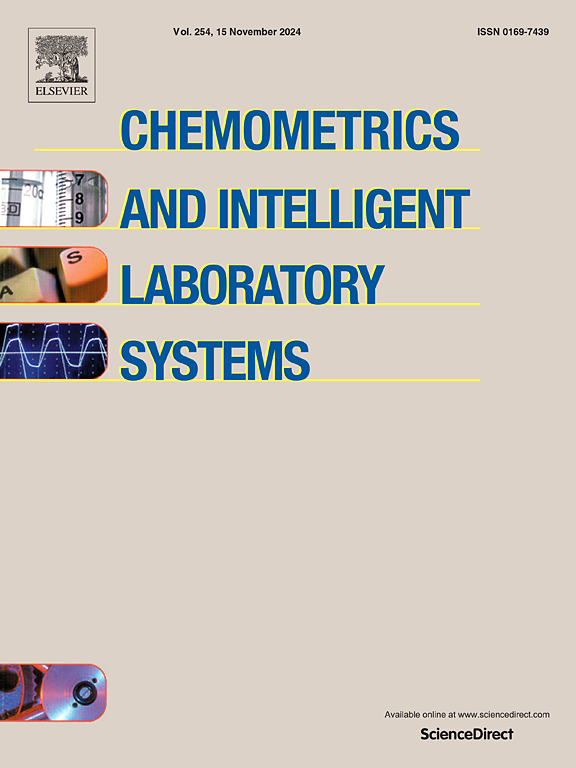Enhanced predictive accuracy of pancreatic ductal adenocarcinoma staging: A synergistic approach merging machine learning algorithms with metabolic profiling
IF 3.8
2区 化学
Q2 AUTOMATION & CONTROL SYSTEMS
Chemometrics and Intelligent Laboratory Systems
Pub Date : 2025-07-26
DOI:10.1016/j.chemolab.2025.105497
引用次数: 0
Abstract
Early diagnosis and treatment are pivotal for enhancing the survival rates of pancreatic cancer patients, emphasizing the necessity for precise staging of pancreatic ductal adenocarcinoma (PDAC). This study presents a hybrid model that combines convolutional neural networks (CNNs), long short-term memory (LSTM) networks, and traditional machine learning (ML) methods to predict PDAC staging based on metabolic characteristics. To address the data imbalance in PDAC datasets, the adaptive synthetic (ADASYN) sampling algorithm was utilized to augment minority class samples. The CNN-LSTM-ML hybrid model was developed and its performance was evaluated against traditional classification methods. The hybrid model achieved an optimal classification accuracy of 90.00 %, surpassing the performance of traditional methods. The confusion matrix indicated 100 % prediction accuracy for PDAC-I and PDAC-IV stages, and 66.67 % and 83.33 % for PDAC-II and PDAC-III stages, respectively. Validation across datasets with varying degrees of malnutrition confirmed the model's reliability. These results demonstrated the excellent predictive performance of the CNN-LSTM-ML hybrid model and its potential applicability to staging prediction in other clinical conditions, contributing to the advancement of precision and personalized medical interventions.
提高胰腺导管腺癌分期的预测准确性:将机器学习算法与代谢谱相结合的协同方法
早期诊断和治疗是提高胰腺癌患者生存率的关键,强调了胰腺导管腺癌(PDAC)精确分期的必要性。本研究提出了一个混合模型,该模型结合了卷积神经网络(cnn)、长短期记忆(LSTM)网络和传统机器学习(ML)方法,根据代谢特征预测PDAC的分期。为了解决PDAC数据集的数据不平衡问题,采用自适应合成(ADASYN)采样算法对少数类样本进行扩充。建立了CNN-LSTM-ML混合模型,并与传统分类方法进行了性能比较。混合模型的分类精度达到了90.00 %,超过了传统方法的分类精度。混淆矩阵显示PDAC-I和PDAC-IV分期的预测准确率为100%,PDAC-II和PDAC-III分期的预测准确率分别为66.67%和83.33%。不同营养不良程度的数据集验证了该模型的可靠性。这些结果表明,CNN-LSTM-ML混合模型具有良好的预测性能,并可能适用于其他临床条件下的分期预测,有助于推进精准化和个性化医疗干预。
本文章由计算机程序翻译,如有差异,请以英文原文为准。
求助全文
约1分钟内获得全文
求助全文
来源期刊
CiteScore
7.50
自引率
7.70%
发文量
169
审稿时长
3.4 months
期刊介绍:
Chemometrics and Intelligent Laboratory Systems publishes original research papers, short communications, reviews, tutorials and Original Software Publications reporting on development of novel statistical, mathematical, or computer techniques in Chemistry and related disciplines.
Chemometrics is the chemical discipline that uses mathematical and statistical methods to design or select optimal procedures and experiments, and to provide maximum chemical information by analysing chemical data.
The journal deals with the following topics:
1) Development of new statistical, mathematical and chemometrical methods for Chemistry and related fields (Environmental Chemistry, Biochemistry, Toxicology, System Biology, -Omics, etc.)
2) Novel applications of chemometrics to all branches of Chemistry and related fields (typical domains of interest are: process data analysis, experimental design, data mining, signal processing, supervised modelling, decision making, robust statistics, mixture analysis, multivariate calibration etc.) Routine applications of established chemometrical techniques will not be considered.
3) Development of new software that provides novel tools or truly advances the use of chemometrical methods.
4) Well characterized data sets to test performance for the new methods and software.
The journal complies with International Committee of Medical Journal Editors'' Uniform requirements for manuscripts.

 求助内容:
求助内容: 应助结果提醒方式:
应助结果提醒方式:


